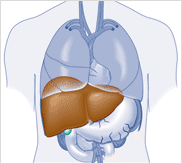Tenofovir
Improves Outcomes of HBV Acute-on-Chronic Liver Failure
SUMMARY
Treatment with tenofovir (Viread) lowers HBV viral load,
reduces liver injury, and decreases the risk of death
in patients with acute-on-chronic liver failure due to
hepatitis B reactivation. |
By
Liz Highleyman
 Spontaneous
reactivation of chronic hepatitis B virus (HBV) infection
can cause acute-on-chronic liver failure (ACLF), or sudden
worsening of liver disease in people who already have chronic
viral hepatitis. Liver transplantation is an accepted treatment
for acute liver failure, but donor livers are in short supply
and antiviral therapy would be an attractive option. Spontaneous
reactivation of chronic hepatitis B virus (HBV) infection
can cause acute-on-chronic liver failure (ACLF), or sudden
worsening of liver disease in people who already have chronic
viral hepatitis. Liver transplantation is an accepted treatment
for acute liver failure, but donor livers are in short supply
and antiviral therapy would be an attractive option.
As
reported in the March
2011 issue of Hepatology, Hitendra Garg and colleagues
in India evaluated the efficacy of tenofovir
-- one of most potent nucleoside/nucleotide analogs approved
for hepatitis B treatment -- and looked at predictors of mortality
in patients with ACLF. Prior research has indicated that the
older hepatitis B drug lamivudine
(Epivir-HBV) is not effective for this purpose.
The
study population included 27 patients with ACLF due to spontaneous
HBV reactivation who were randomly assigned to receive either
tenofovir or placebo. Most (72%) were men and the median age
was 45 years. At baseline the median HBV DNA viral load was
level was 900,000 IU/mL and 56% were hepatitis B "e"
antigen positive.
All
patients were followed for at least 3 months or until death.
The primary endpoint was survival at 3 months. Liver transplants
were unavailable.
Results
 |
At
3 months, the probability of survival was significantly
higher in the tenofovir group compared with the placebo
group (57% vs 15%, respectively). |
 |
The
typical cause of death was progressive liver failure leading
to multi-organ failure. |
 |
HBV
DNA levels declined significantly in the tenofovir group,
but remained stable in the placebo group. |
 |
After
3 months follow-up, 60% of patients in the tenofovir group
experienced HBeAg loss, compared with none in the placebo
group. |
 |
Surviving
patients taking tenofovir experienced significant improvement
in Child-Turcotte-Pugh (CTP) and MELD liver disease scores,
but these did not change in placebo group. |
 |
Having
more than a 2 log reduction in HBV DNA at week 2 was an
independent predictor of survival. |
"Tenofovir
significantly reduces HBV DNA levels, improves CTP and MELD scores,
and reduces mortality in patients with severe spontaneous reactivation
of chronic hepatitis B presenting as ACLF," the researchers
concluded. "Reduction in HBV DNA levels at 2 weeks should be
a desirable goal and is a good predictor of survival."
"The
pathogenesis of severe acute exacerbation is believed to be associated
with vigorous immune response, which results in severe hepatic necro-inflammation
and finally hepatic decompensation," they explained in their
discussion. "It is quite likely that [tenofovir] therapy inhibited
the ongoing necro-inflammation and might even have permitted hepatic
regeneration. Our data convincingly shows that a rapid reduction
in HBV DNA was associated with improvement in indicators of injury
and even survival."
Investigator
affiliations: Department of Gastroenterology, GB Pant Hospital,
New Delhi, India; Department of Hepatology, Institute of Liver &
Biliary Sciences, New Delhi, India; Special Centre for Molecular
Medicine, Jawaharlal Nehru University, New Delhi, India.
5/10/11
Reference
H Garg, SK Sarin, M Kumar, et al. Tenofovir improves the outcome
in patients with spontaneous reactivation of hepatitis B presenting
as acute-on-chronic liver failure. Hepatology 53(3):774-780
(abstract).
March 2011.
|
